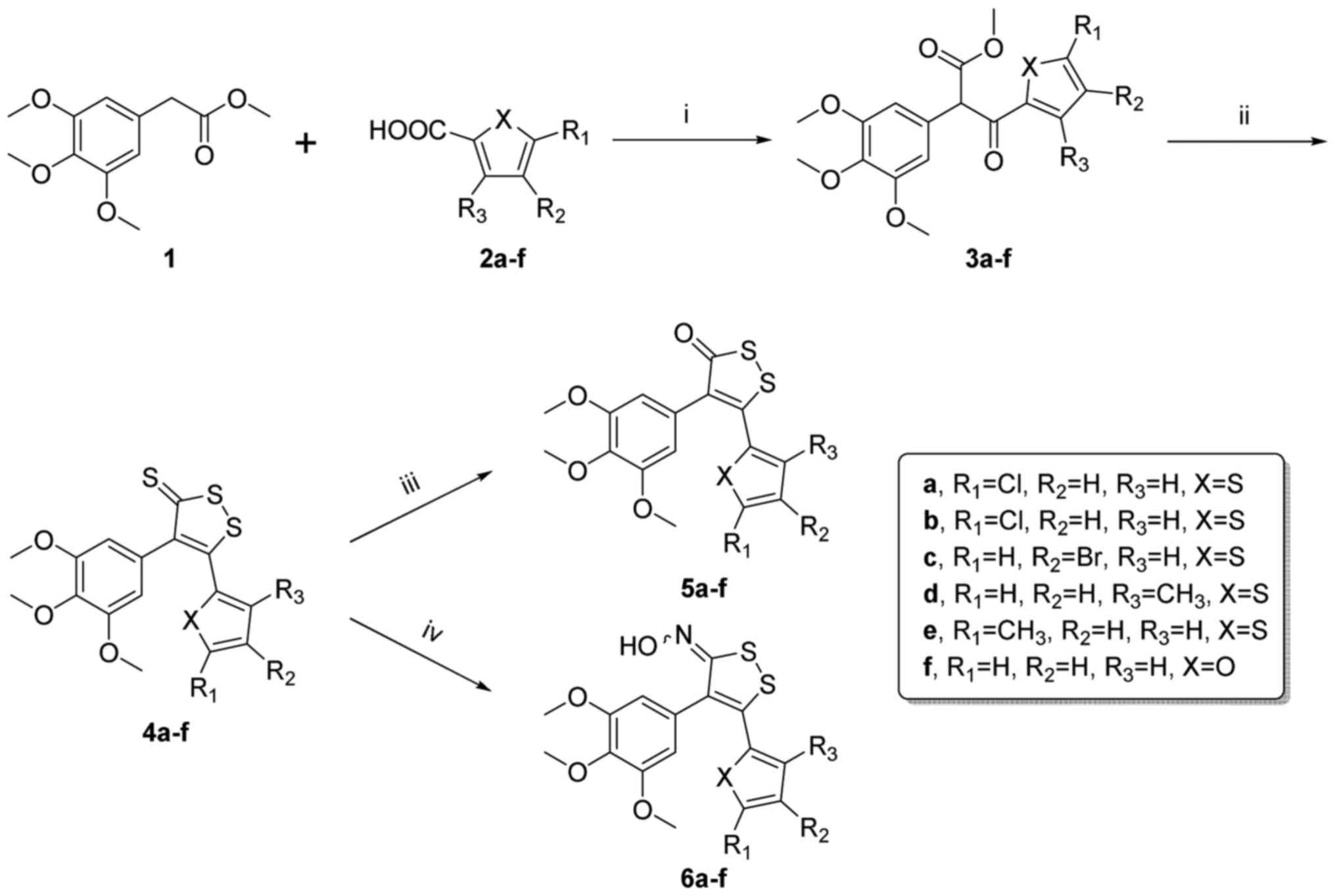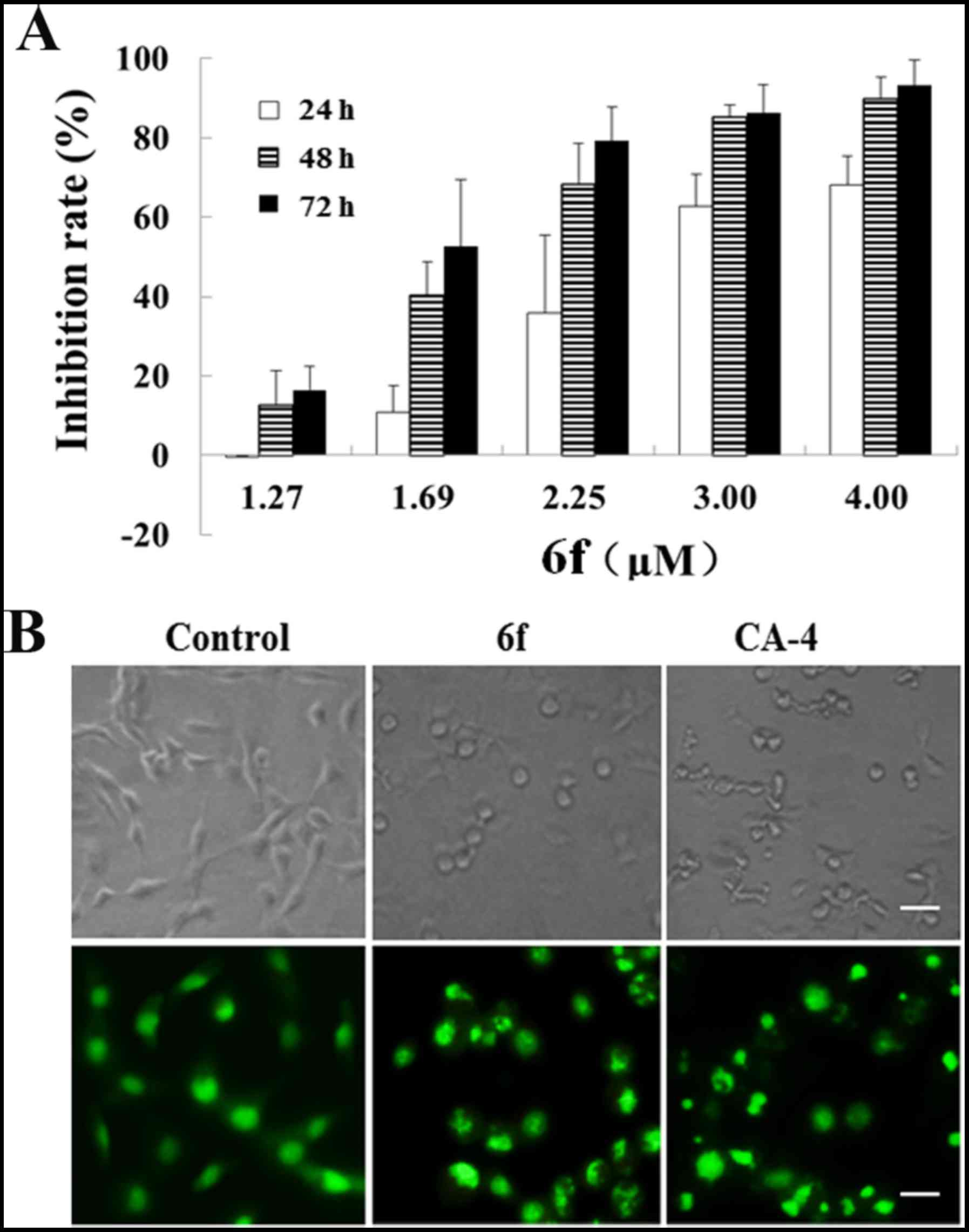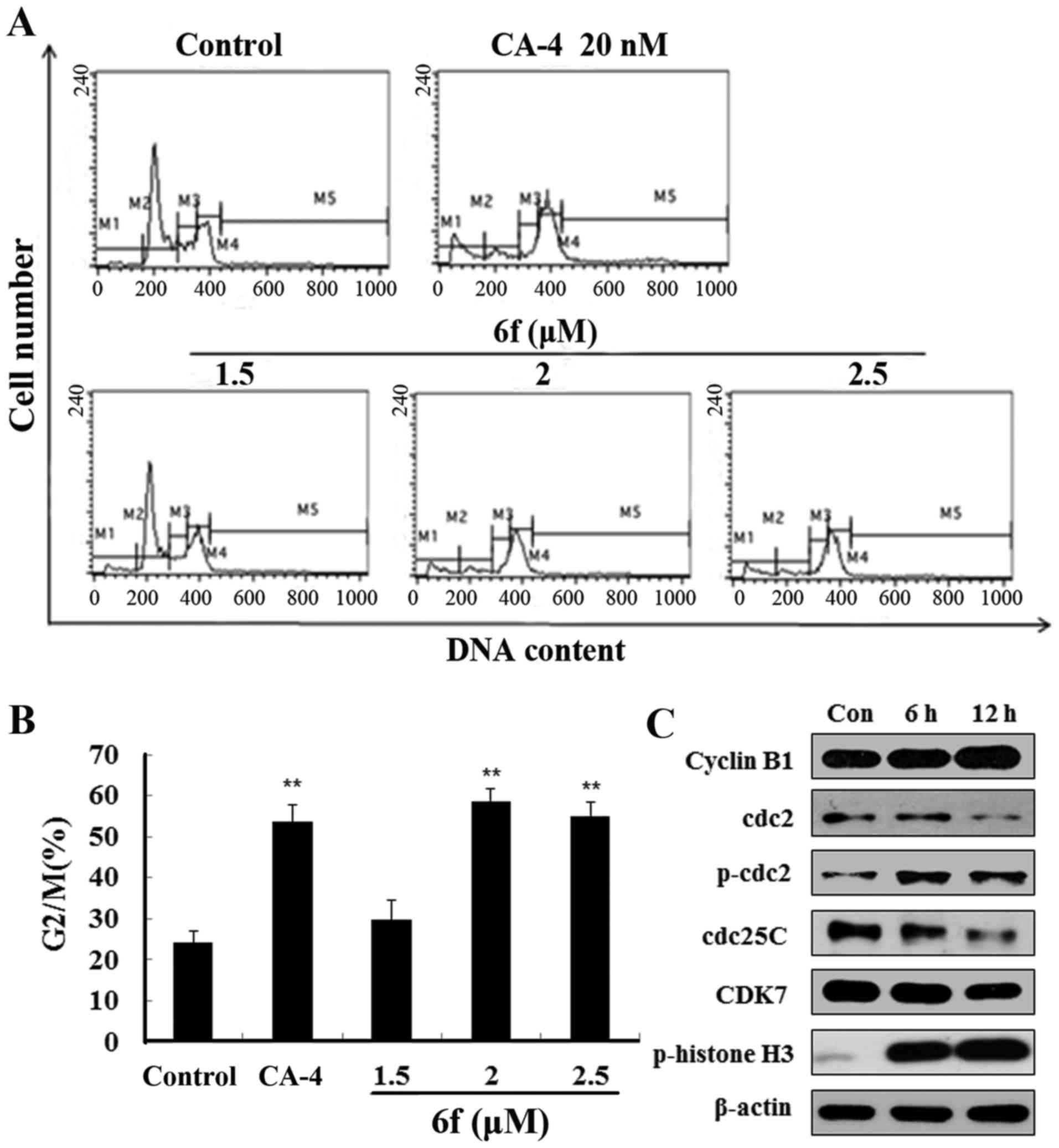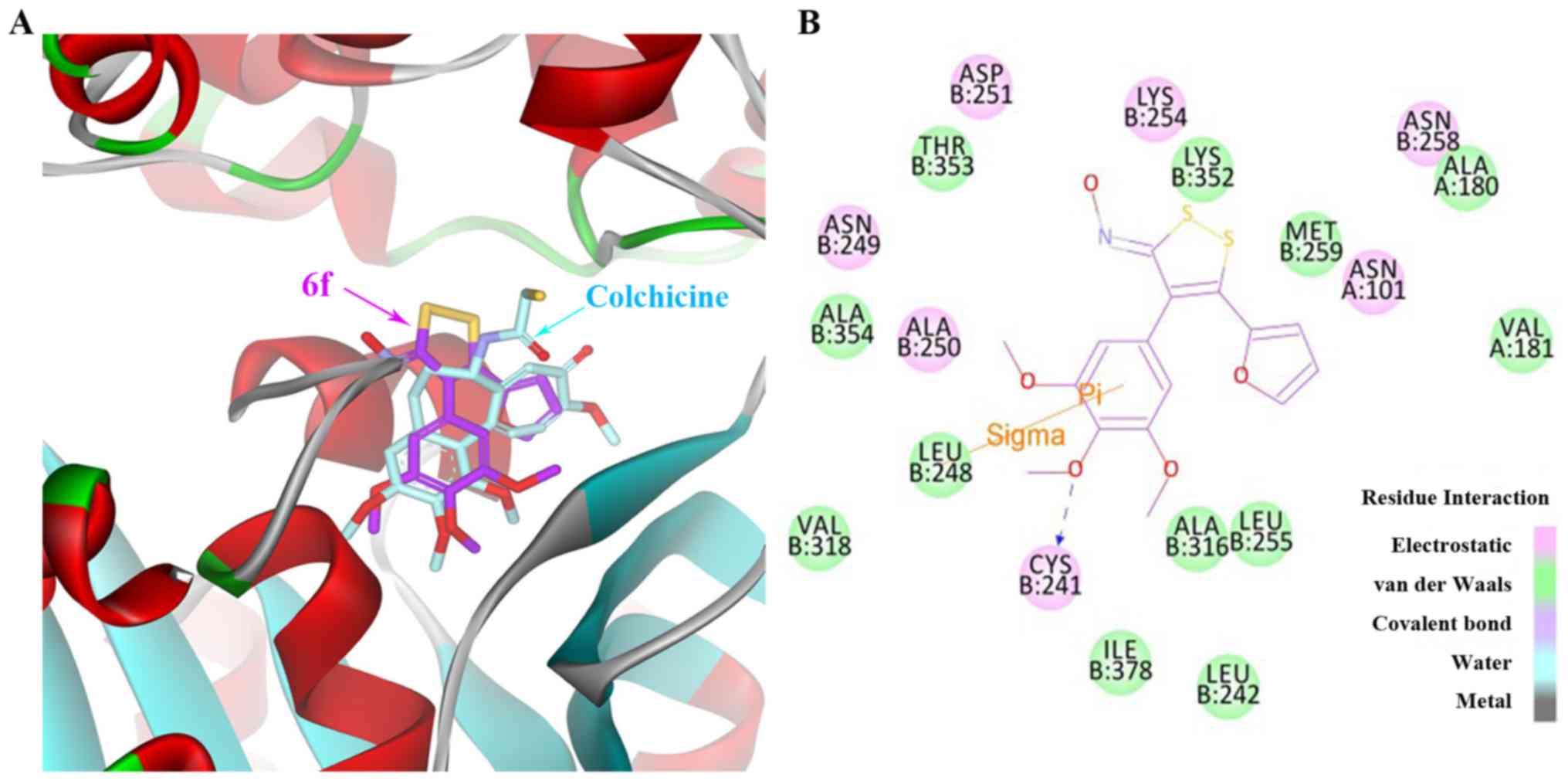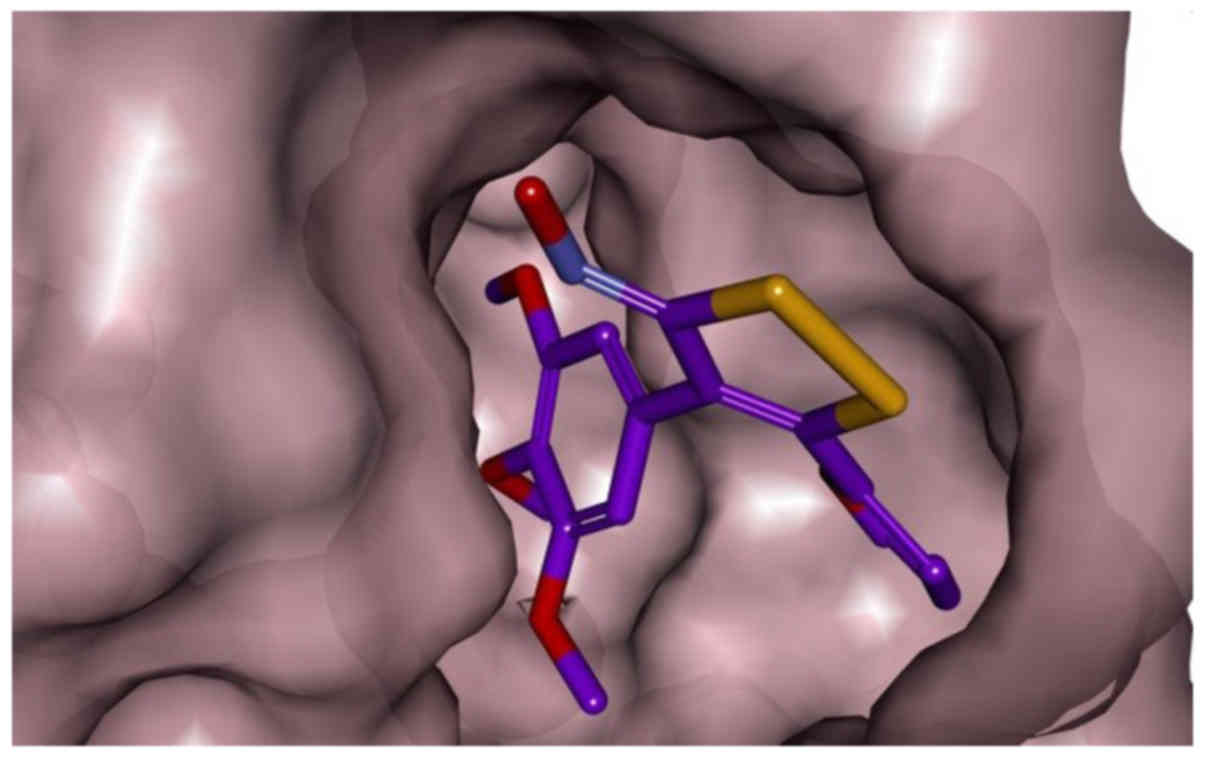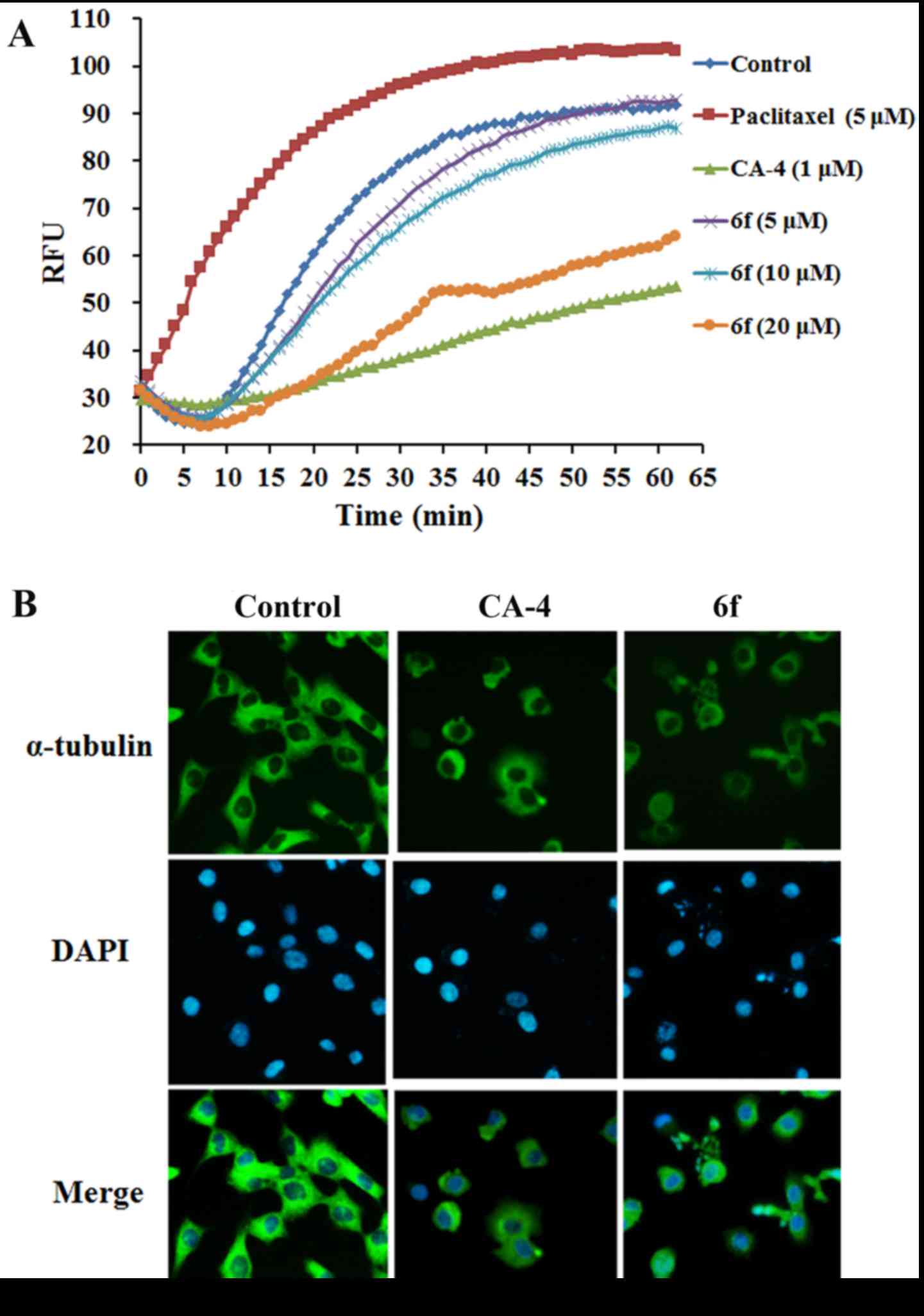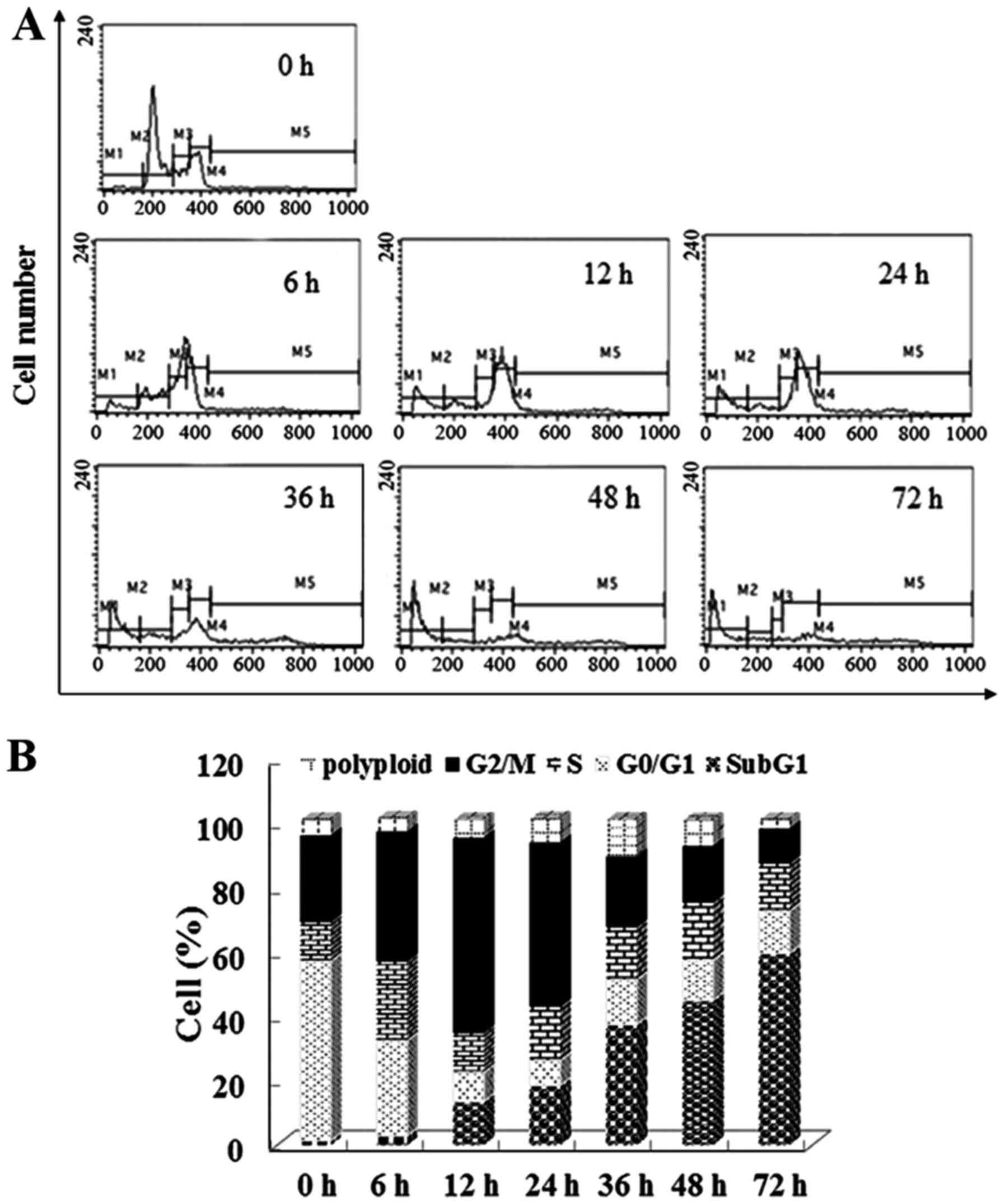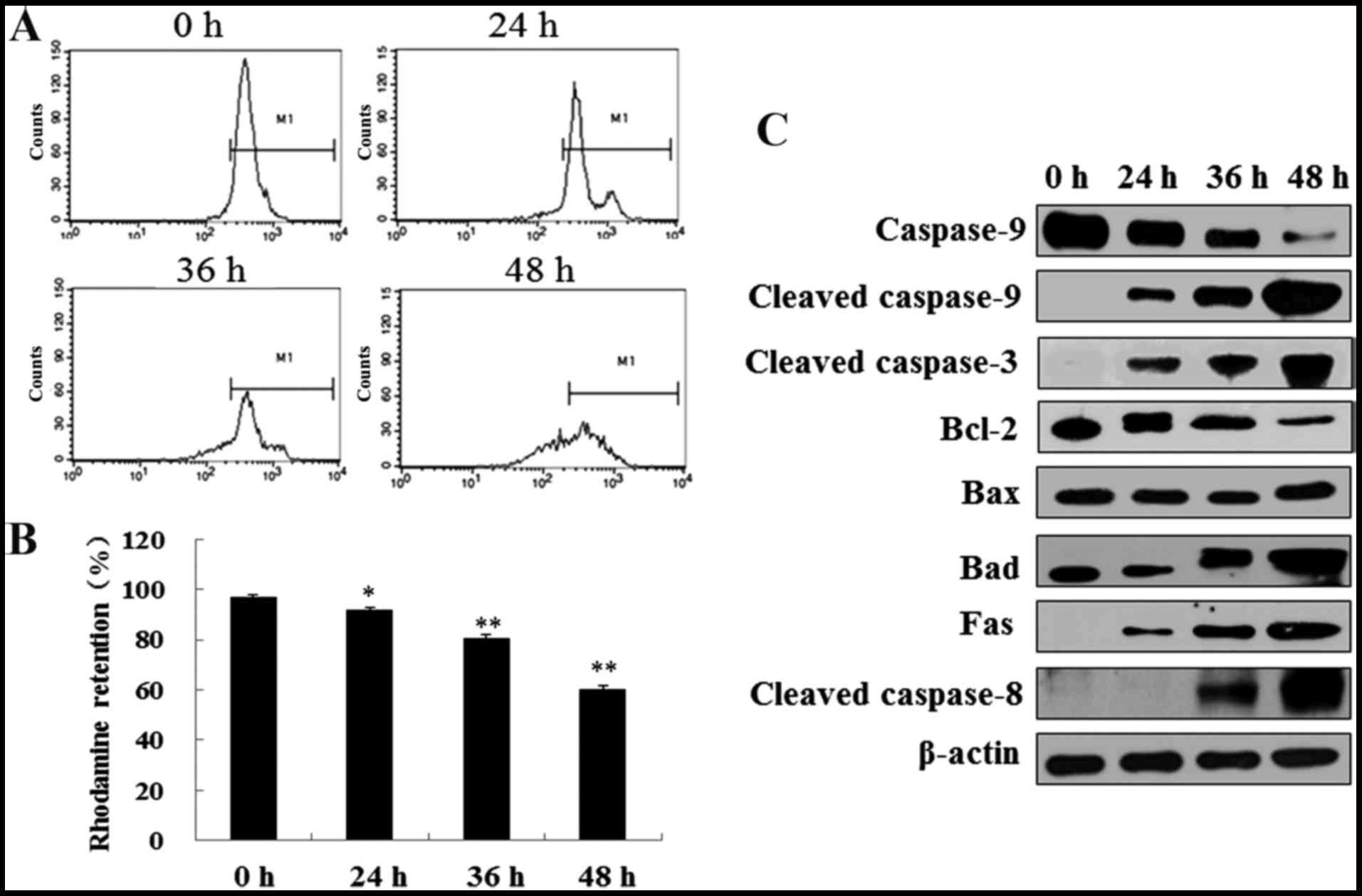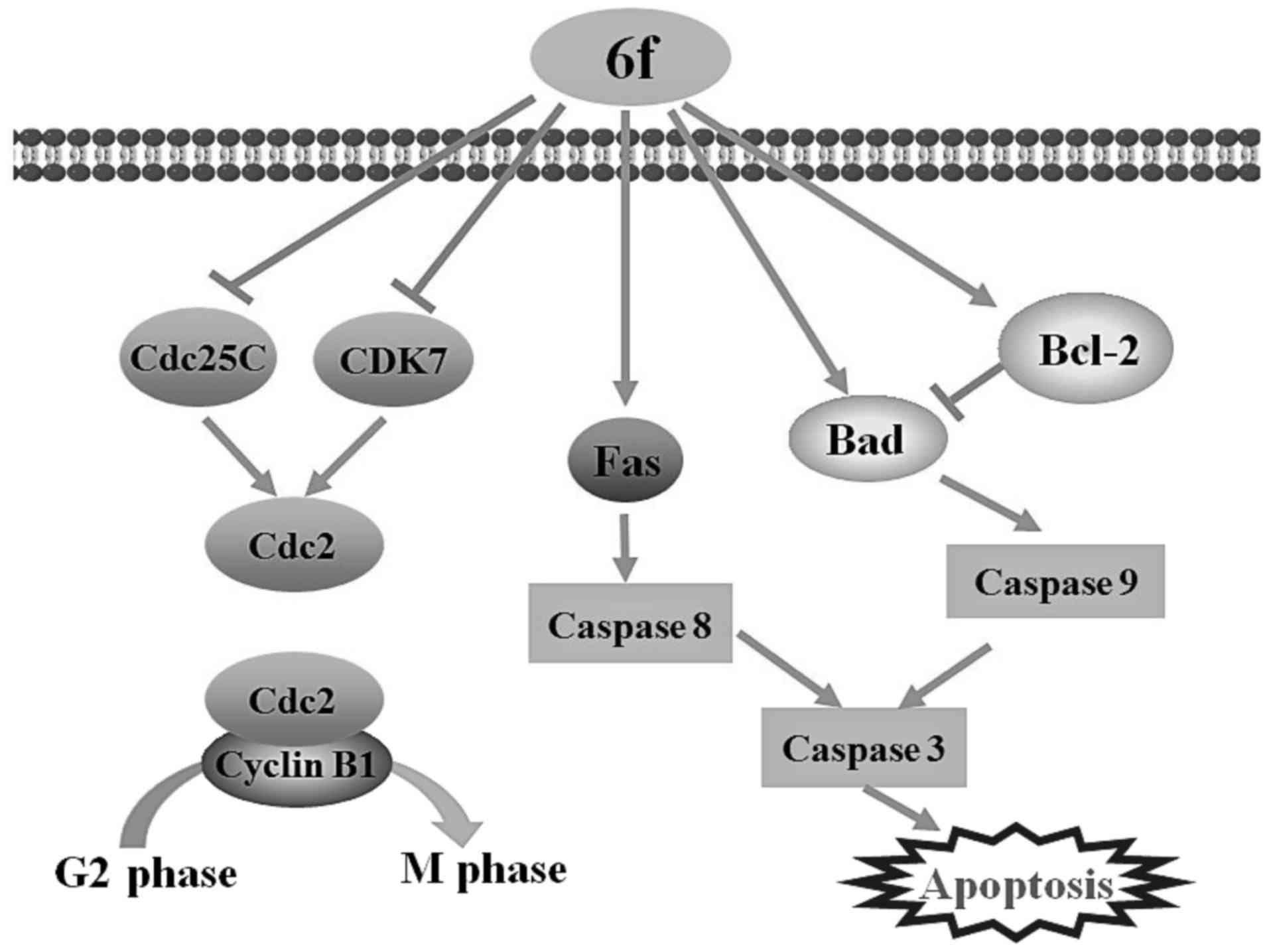|
1
|
Lombardi R, Jovine E, Zanini N, Salone MC,
Gambarotti M, Righi A, Balladelli A, Colangeli M and Rocca M: A
case of lung metastasis in myxoinflammatory fibroblastic sarcoma:
Analytical review of one hundred and thirty eight cases. Int
Orthop. 37:2429–2436. 2013. View Article : Google Scholar : PubMed/NCBI
|
|
2
|
Amos LA: What tubulin drugs tell us about
microtubule structure and dynamics. Semin Cell Dev Biol.
22:916–926. 2011. View Article : Google Scholar : PubMed/NCBI
|
|
3
|
Perez EA: Microtubule inhibitors:
Differentiating tubulin-inhibiting agents based on mechanisms of
action, clinical activity, and resistance. Mol Cancer Ther.
8:2086–2095. 2009. View Article : Google Scholar : PubMed/NCBI
|
|
4
|
de Forges H, Bouissou A and Perez F:
Interplay between microtubule dynamics and intracellular
organization. Int J Biochem Cell Biol. 44:266–274. 2012. View Article : Google Scholar
|
|
5
|
Dumontet C and Jordan MA:
Microtubule-binding agents: A dynamic field of cancer therapeutics.
Nat Rev Drug Discov. 9:790–803. 2010. View
Article : Google Scholar : PubMed/NCBI
|
|
6
|
Kim SN, Kim NH, Park YS, Kim H, Lee S,
Wang Q and Kim YK: 7-Diethylamino-3(2′-benzoxazolyl)-coumarin is a
novel microtubule inhibitor with antimitotic activity in multidrug
resistant cancer cells. Biochem Pharmacol. 77:1773–1779. 2009.
View Article : Google Scholar : PubMed/NCBI
|
|
7
|
Chang LC, Yu YL, Hsieh MT, Wang SH, Chou
RH, Huang WC, Lin HY, Hung HY, Huang LJ and Kuo SC: A novel
microtubule inhibitor, MT3-037, causes cancer cell apoptosis by
inducing mitotic arrest and interfering with microtubule dynamics.
Am J Cancer Res. 6:747–763. 2016.PubMed/NCBI
|
|
8
|
Velasco-Velázquez MA, Agramonte-Hevia J,
Barrera D, Jiménez-Orozco A, García-Mondragón MJ, Mendoza-Patiño N,
Landa A and Mandoki J: 4-Hydroxycoumarin disorganizes the actin
cytoskeleton in B16-F10 melanoma cells but not in B82 fibroblasts,
decreasing their adhesion to extracellular matrix proteins and
motility. Cancer Lett. 198:179–186. 2003. View Article : Google Scholar : PubMed/NCBI
|
|
9
|
Gismondi A, Nanni V, Reina G, Orlanducci
S, Terranova ML and Canini A: Nanodiamonds coupled with
5,7-dimethoxycoumarin, a plant bioactive metabolite, interfere with
the mitotic process in B16F10 cells altering the actin
organization. Int J Nanomed. 11:557–574. 2016. View Article : Google Scholar
|
|
10
|
Kavallaris M, Annereau JP and Barret JM:
Potential mechanisms of resistance to microtubule inhibitors. Semin
Oncol. 35(Suppl 3): S22–S27. 2008. View Article : Google Scholar : PubMed/NCBI
|
|
11
|
Pettit GR, Singh SB, Hamel E, Lin CM,
Alberts DS and Garcia-Kendall D: Isolation and structure of the
strong cell growth and tubulin inhibitor combretastatin A-4.
Experientia. 45:209–211. 1989. View Article : Google Scholar : PubMed/NCBI
|
|
12
|
Aziz G, Odlo K, Hansen TV, Paulsen RE and
Mathisen GH: Combretastatin A-4 and structurally related triazole
analogues induce caspase-3 and reactive oxygen species-dependent
cell death in PC12 cells. Eur J Pharmacol. 703:25–32. 2013.
View Article : Google Scholar : PubMed/NCBI
|
|
13
|
Xu Q, Qi H, Sun M, Zuo D, Jiang X, Wen Z,
Wang Z, Wu Y and Zhang W: Synthesis and biological evaluation of
3-alkyl-1,5-diaryl-1h-pyrazoles as rigid analogues of
combretastatin a-4 with potent antiproliferative activity. PLoS
One. 10:e01287102015. View Article : Google Scholar : PubMed/NCBI
|
|
14
|
Mahal K, Biersack B, Caysa H, Schobert R
and Mueller T: Combretastatin A-4 derived imidazoles show
cytotoxic, antivascular, and antimetastatic effects based on
cytoskeletal reorganisation. Invest New Drugs. 33:541–554. 2015.
View Article : Google Scholar : PubMed/NCBI
|
|
15
|
Zuo D, Guo D, Jiang X, Guan Q, Qi H, Xu J,
Li Z, Yang F, Zhang W and Wu Y:
3-(3-Hydroxy-4-methoxyphenyl)-4-(3,4,5-trimethoxyphenyl)-1,2,5-selenadiazole
(G-1103), a novel combretastatin A-4 analog, induces G2/M arrest
and apoptosis by disrupting tubulin polymerization in human
cervical HeLa cells and fibrosarcoma HT-1080 cells. Chem Biol
interact. 227:7–17. 2015. View Article : Google Scholar
|
|
16
|
Wen Z, Li X, Zuo D, Lang B, Wu Y, Jiang M,
Ma H, Bao K, Wu Y and Zhang W: Ultrasound-promoted two-step
synthesis of 3-arylselenylindoles and 3-arylthioindoles as novel
combretastatin A-4 analogues. Sci Rep. 6:239862016. View Article : Google Scholar : PubMed/NCBI
|
|
17
|
Duan YT, Man RJ, Tang DJ, Yao YF, Tao XX,
Yu C, Liang XY, Makawana JA, Zou MJ, Wang ZC, et al: Design,
synthesis and antitumor activity of novel link-bridge and b-ring
modified combretastatin a-4 (ca-4) analogues as potent antitubulin
agents. Sci Rep. 6:253872016. View Article : Google Scholar : PubMed/NCBI
|
|
18
|
Wang Z, Qi H, Shen Q, Lu G, Li M, Bao K,
Wu Y and Zhang W: 4,5-Diaryl-3H-1,2-dithiole-3-thiones and related
compounds as combretastatin A-4/oltipraz hybrids: Synthesis,
molecular modelling and evaluation as antiproliferative agents and
inhibitors of tubulin. Eur J Med Chem. 122:520–529. 2016.
View Article : Google Scholar : PubMed/NCBI
|
|
19
|
Qiao F, Zuo D, Shen X, Qi H, Wang H, Zhang
W and Wu Y: DAT-230, a novel microtubule inhibitor, exhibits potent
antitumor activity by inducing G2/M phase arrest, apoptosis in
vitro and perfusion decrease in vivo to HT-1080. Cancer Chemother
Pharmacol. 70:259–270. 2012. View Article : Google Scholar : PubMed/NCBI
|
|
20
|
Eisenlöffel C, Schmöle AC, Pews-Davtyan A,
Brennführer A, Kuznetsov SA, Hübner R, Frech S, Schult C, Junghanss
C, Beller M, et al: Interference of a novel indolylmaleimide with
microtubules induces mitotic arrest and apoptosis in human
progenitor and cancer cells. Biochem Pharmacol. 85:763–771. 2013.
View Article : Google Scholar : PubMed/NCBI
|
|
21
|
Yu G, Chen X, Chen S, Ye W, Hou K and
Liang M: Arsenic trioxide reduces chemo-resistance to
5-fluorouracil and cisplatin in HBx-HepG2 cells via complex
mechanisms. Cancer Cell int. 15:1162015. View Article : Google Scholar : PubMed/NCBI
|
|
22
|
Islam MN and Iskander MN: Microtubulin
binding sites as target for developing anticancer agents. Mini Rev
Med Chem. 4:1077–1104. 2004. View Article : Google Scholar : PubMed/NCBI
|
|
23
|
Huang Z, Xu Y and Peng W: Colchicine
induces apoptosis in HT-29 human colon cancer cells via the AKT and
c-Jun N-terminal kinase signaling pathways. Mol Med Rep.
12:5939–5944. 2015.PubMed/NCBI
|
|
24
|
Chiu WH, Luo SJ, Chen CL, Cheng JH, Hsieh
CY, Wang CY, Huang WC, Su WC and Lin CF: Vinca alkaloids cause
aberrant ROS-mediated JNK activation, Mcl-1 downregulation, DNA
damage, mitochondrial dysfunction, and apoptosis in lung
adenocarcinoma cells. Biochem Pharmacol. 83:1159–1171. 2012.
View Article : Google Scholar : PubMed/NCBI
|
|
25
|
Ganansia-Leymarie V, Bischoff P, Bergerat
JP and Holl V: Signal transduction pathways of taxanes-induced
apoptosis. Curr Med Chem Anticancer Agents. 3:291–306. 2003.
View Article : Google Scholar : PubMed/NCBI
|
|
26
|
Hsieh CC, Kuo YH, Kuo CC, Chen LT, Cheung
CH, Chao TY, Lin CH, Pan WY, Chang CY, Chien SC, et al:
Chamaecypanone C, a novel skeleton microtubule inhibitor, with
anticancer activity by trigger caspase 8-Fas/FasL dependent
apoptotic pathway in human cancer cells. Biochem Pharmacol.
79:1261–1271. 2010. View Article : Google Scholar
|
|
27
|
Chen CH, Liao CH, Chang YL, Guh JH, Pan SL
and Teng CM: Protopine, a novel microtubule-stabilizing agent,
causes mitotic arrest and apoptotic cell death in human
hormone-refractory prostate cancer cell lines. Cancer Lett.
315:1–11. 2012. View Article : Google Scholar
|
|
28
|
Vermeulen K, Van Bockstaele DR and
Berneman ZN: The cell cycle: A review of regulation, deregulation
and therapeutic targets in cancer. Cell Prolif. 36:131–149. 2003.
View Article : Google Scholar : PubMed/NCBI
|
|
29
|
Zhu H, Zhang J, Xue N, Hu Y, Yang B and He
Q: Novel combretastatin A-4 derivative XN0502 induces cell cycle
arrest and apoptosis in A549 cells. Invest New Drugs. 28:493–501.
2010. View Article : Google Scholar : PubMed/NCBI
|
|
30
|
Tao L, Fu R, Wang X, Yao J, Zhou Y, Dai Q,
Li Z, Lu N and Wang W: LL-202, a newly synthesized flavonoid,
inhibits tumor growth via inducing G(2)/M phase arrest and cell
apoptosis in MCF-7 human breast cancer cells in vitro and in vivo.
Toxicol Lett. 228:1–12. 2014. View Article : Google Scholar : PubMed/NCBI
|
|
31
|
Elmore S: Apoptosis: A review of
programmed cell death. Toxicol Pathol. 35:495–516. 2007. View Article : Google Scholar : PubMed/NCBI
|
|
32
|
Ouyang L, Shi Z, Zhao S, Wang FT, Zhou TT,
Liu B and Bao JK: Programmed cell death pathways in cancer: A
review of apoptosis, autophagy and programmed necrosis. Cell
Prolif. 45:487–498. 2012. View Article : Google Scholar : PubMed/NCBI
|
|
33
|
Mollinedo F and Gajate C: Microtubules,
microtubule-interfering agents and apoptosis. Apoptosis. 8:413–450.
2003. View Article : Google Scholar : PubMed/NCBI
|
|
34
|
Jeung HC, Che XF, Haraguchi M, Furukawa T,
Zheng CL, Sumizawa T, Rha SY, Roh JK and Akiyama S: Thymidine
phosphorylase suppresses apoptosis induced by
microtubule-interfering agents. Biochem Pharmacol. 70:13–21. 2005.
View Article : Google Scholar : PubMed/NCBI
|
|
35
|
Zhou L, Cai X, Han X, Xu N and Chang DC:
CDK1 switches mitotic arrest to apoptosis by phosphorylating
Bcl-2/Bax family proteins during treatment with microtubule
interfering agents. Cell Biol Int. 38:737–746. 2014. View Article : Google Scholar : PubMed/NCBI
|
|
36
|
Khan KH, Blanco-Codesido M and Molife LR:
Cancer therapeutics: Targeting the apoptotic pathway. Crit Rev
Oncol Hematol. 90:200–219. 2014. View Article : Google Scholar : PubMed/NCBI
|
|
37
|
Ola MS, Nawaz M and Ahsan H: Role of Bcl-2
family proteins and caspases in the regulation of apoptosis. Mol
Cell Biochem. 351:41–58. 2011. View Article : Google Scholar : PubMed/NCBI
|
|
38
|
Parrish AB, Freel CD and Kornbluth S:
Cellular mechanisms controlling caspase activation and function.
Cold Spring Harb Perspect Biol. 5:52013. View Article : Google Scholar
|
|
39
|
Golks A, Brenner D, Fritsch C, Krammer PH
and Lavrik IN: c-FLIPR, a new regulator of death receptor-induced
apoptosis. J Biol Chem. 280:14507–14513. 2005. View Article : Google Scholar : PubMed/NCBI
|
|
40
|
Saelens X, Festjens N, Vande Walle L, van
Gurp M, van Loo G and Vandenabeele P: Toxic proteins released from
mitochondria in cell death. Oncogene. 23:2861–2874. 2004.
View Article : Google Scholar : PubMed/NCBI
|
|
41
|
Wang CC, Liu HE, Lee YL, Huang YW, Chen
YJ, Liou JP and Huang HM: Mpt0b169, a novel tubulin inhibitor,
induces apoptosis in taxol-resistant acute myeloid leukemia cells
through mitochondrial dysfunction and mcl-1 downregulation. Tumour
Biol. 37:6065–6072. 2016. View Article : Google Scholar
|















